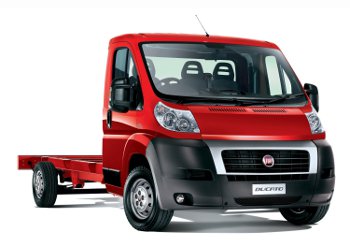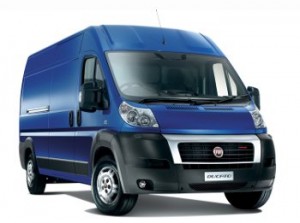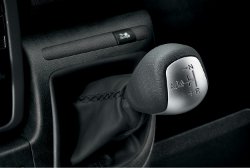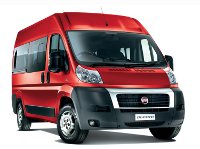New Fiat Ducato Launched With Euro 5 Engines

Fiat has just launched the new version of its Ducato van. The launch was virtually necessitated by the need to move to Euro 5 engines and Fiat has taken advantage of this to launch a completely new range of engines, along with a raft of other improvements aimed at improving performance, comfort and refinement.
The Ducato dominates the motorhome market – although it is not universally liked by motorhomers, it is the default choice for the majority of motorhome converters across Europe.
Fiat has developed this relationship over the years and the low, wide, front-wheel drive platform provided by the Ducato does make a good base for mainstream motorhomes.
Fiat even provides special motorhome versions of its chassis cab, featuring a wider track than normal (the width between the wheels) and offering a ‘front-end only’ model onto which converters can bolt an alternative chassis platform, usually provided by Alko.
So What’s New?
The big news is the engines. In line with the coming EU legislation, all engines are now Euro 5 compliant and there have been improvements in fuel consumption, emissions and performance.

The UK market will get two engines with four power levels:
- 2.3-litre diesel (110bhp, 130bhp & 150bhp)
- 3-litre diesel (180bhp)
(Left-hand drive markets will also get a 2-litre engine, in place of the 110bhp 2.3l model. The 2l engine proved too hard to shoehorn into a right-hand drive configuration, so the UK gets a detuned 110bhp 2.3l instead.)
The 110bhp model featured a 20% improvement in torque over its 2.2l predecessor, along with a 10% improvement in fuel economy and a 11% reduction in emissions.
The 150bhp model, which is likely to be popular with the coachbuilt motorhome market, boasts 350Nm of torque at just 1,500rpm while the new 3l model provides 400Nm of torque at just 1,400rpm, which should enable even large motorhomes to make swift, relaxed progress in all conditions.
Weight wise, the Ducato has again been specified with an eye to the motorhome market. I cannot imagine that many commercial van operators will choose the 4,000kg option unless they really need it, as their drivers will then be forced to have speed limiters fitted and work with a tachograph.

However, no such restrictions apply to motorhome users (travelling for leisure purposes) and the additional 500kg payload is very useful for larger motorhomes.
Self-levelling air suspension is also now a factory option, something which should work well for larger motorhomes and help reduce traction and weight distribution problems.
In the cab, equipment levels, dashboard plastics and sound proofing have all been improved to provide a more car-like experience, although Fiat’s Comfort-Matic automated gearbox is only available with the 3-litre engine, meaning that the bulk of Ducato motorhomes will come with Fiat’s six-speed manual gearbox.
First Impressions

Initial reviews of the new Ducato in the van trade press are very positive and the Ducato’s new engines should be a considerable improvement over the old (already decent) units.
Although it is not universally popular, I believe that the Ducato is almost certain to continue its leading role in the motorhome conversion market: Fiat’s low, wide platform, good engines and competitive pricing are ideal for mainstream motorhomes.
It is important to remember that motorhomes tend to do very low mileages and spend a lot of time being used as accommodation, not as a vehicles. This means that the Ducato’s qualities are ideal for the job and will, for most motorhome users, outweigh any dynamic or durability advantages offered by more expensive rear-wheel drive vans like the Mercedes-Benz Sprinter or Iveco Daily.

Taken delivery of a Swift Motorhome with the Euro 5 engine 2.3ltr, would not pull the skin of a rice pudding. Big mistake owning this.
Karlos,
Interesting comment, they have been generally well reviewed elsewhere. What power is your engine?
Roland
148, fuel economy 15mpg.
Hi Roland,
2.3ltr 150mj Swift Kon Tiki tag axle, sixth gear is redundant unless going downhill, fifth gear just holds on the flat, however a slight incline and then you are in fourth, fuel economy now is out of the window.
Regards Karlos
Hi Karlos,
I thought it must be a big model from the figures you quoted. I guess it will always be noticeably slower and thirstier than the equivalent panel van – it is a big (un)aerodynamic lump!
The 3l engine probably gives more relaxed performance in a motorhome that size, but your 150 shouldn’t be too bad. What did you have previously (if any)?
I know when I’ve driven small panel vans like the Vauxhall Vivaro, sixth gear is no use unless flat out on the motorway or downhill, so I can imagine that it is worse with a big motorhome.
Regards, Roland
Previous Motorhome euro 4, 3.0ltr far superior. this one is C**p.
Fiat are talking up the torque of the 2.3 ltr models but from your experience it sounds like there is still no substitute for cubic capacity when you get to 3.5t and above and have a large, heavy coachbuilt body.
Hi Roland,
Thanks for obvious this 2.3ltr was a replacment due to poor build quality issues, we had our concerns before we had this one, my advice would be to anyone looking at this post. Don’t but a 2.3ltr version coachbuilt, stick to a van conversion.
Regards arl.
Just an update on the above post(s).
Tank to Tank fuel check average 17.8Mpg, Still no pulling power, Fiat say it’s not their problem,
Swift Group (Hull) the coach builder say it’s not their problem. nobody wants to help, so stuck with a poor performing waste of fuel economy Motorhome.
Pingback: Fiat Confirms Details of Ducato Motorhome Specification
hi i own a uro 4 swift escape motorhome i think by all your comments that this eu is getting to you all my van dare i say good high motorway speed plenty of power by the way this is a 624 i am averaging 28.5 mile per gallon according to the inboard computer and i do not drive that slow i keep up with the traffic don around 7000 miles if this goverment and the eu haVE THEIR WAY IT WILL BE IN THE SCRAP YARD THIS TIME NEXT YEAR GLOBAL WARMING MY A??.
IN Australia these Fiats have a rotten reputation, bad handling, get bogged on the slightest damp incline, bad electrical issues and clutch burnouts.
Cheers
Aussie Mike
Only do low mileage? I have done 83000 Km in 4 years with my 3l myo2010 ducato average 12l/100km (about 24mpg). Handling is excellent, wife had it on two wheels to miss a cow at 80Kph no probs.
I am interested on some advice on a FIAT 2.3 Litre 130 bhp Euro 5 Turbo Diesel with 6 speed. Its a motorhome. A friend advised me not to buy it as it was underpowered for our Aussie conditions?
Depending on the size of the motorhome you may well find it a bit underpowered. Opinions vary on this one — in the UK/Europe, this engine is fitted to a wide variety of vans without problem, but many do very low mileages, often in quite easy (flat) conditions. Personally, for serious touring, I’d prefer a bigger/more powerful engine.
i am about to buy a new motorhome with a Fiat engine but unsure if i should get the upgraded 3ltr 180bhp engine or the standard 2.3ltr 150bhp engine. the motorhome weighs in at 4.5ton. any advice regarding fuel consumption and performance would be apreciated
Hi Graham,
4.5 tonne is a fairly hefty weight for the 2.3l engine. Although the smaller engine will work, I’d choose the 3l 180bhp engine if I could afford to. The increased torque should really improve the driving experience and help maintain a decent average speed on long journeys, especially if you plan on doing some miles or going abroad (where they have bigger hills than the UK!).
Cheers, Roland
Hi Roland,
Thanks for your input. do you have any information regarding mpg between the two engines. we do plan to travel through the Pyrenees mountains onto the Spanish coast with the chosen one next summer so our decision is very important. thanks again.
regards
Graham
Hi Graham,
Sorry for the delay in getting back to you, I’ve been on holiday. I haven’t owned a vehicle with either engine but I’d expect fuel consumption to be higher with the big engine. I’m not sure how big the difference would be but it’s worth considering that the 2.3l is likely to be less efficient than in smaller motorhomes due to the heavy loading of a larger vehicle. Conversely the larger engine will be less stressed and thus perform more efficiently.
Might be worth asking a dealer or looking at product literature/magazine reviews for more detail on consumption. Or ask for owners’ views on motorhome forums such as Motorhome Fun or Motohome Facts, if you haven’t already.
Regards,
Roland
Hi Roland,
thanks for the info. It seems most advise me to go for the 3ltr 180 engine. with that in mind i have now ordered the 180.
thanks again
Graham
Hi there
What are the differences between a ducato euro5 cabin and the euro6 cab? (Motorhome market)
It seems to me there is a link between fuel consumption, headwinds and the way you drive. I bought a Burstner 740 weighing 3.8tonnes 2 years ago with 11k miles on the clock. At first I got 27mpg but on a trip to Italy in June 2017 with the clock at 17k I suddenly started getting a phenomenal 37mpg on the trip computer, a performance which stood up against gallonage. Back in the UK it was down to 29mpg on motorway runs. In August this year I downsized to a van conversion weighing 2.9 tonnes with 8.5k on the clock (three years old, very low mileage) and it was slow and turning in 25mpg. Took it to France and by the time we got back with 3k more miles on the clock it was doing 33.3 mpg for the whole of the return trip with a 4mph tailwind.. Running in and giving the engine a good working over, plus using best fuels every third tank, makes a big difference. I suspect that when this van has 17-18000 on the clock it will be doing a regular 33/34 mpg. Both engines mentioned were 2013 2.3litre 130 series. Oil consumption negligible.
Hi Dave,
Definitely agree that diesels need running in before they deliver optimum mpg. The kind of mileage driven by most motorhomes is barely enough to achieve this, given that vans in commercial use are designed to rack up 50-100k per year without problems.
Honest John is a big fan of premium fuels and while my own experience is mixed, I do believe they can help a little.
Regards, Roland